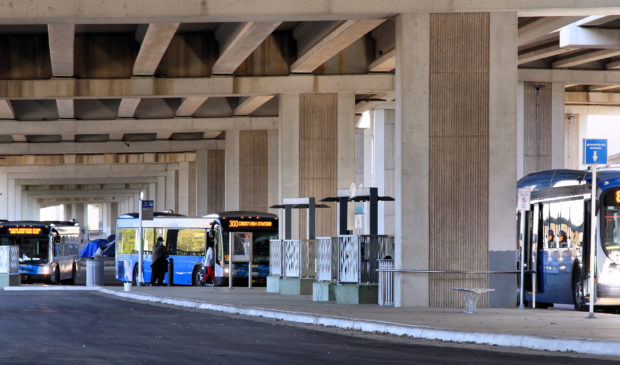Cap Metro board fields 2022 budgetary updates
Thursday, July 1, 2021 by
Seth Smalley At the June 28 meeting of the Capital Metropolitan Transportation Authority Board of Directors, members fielded budgetary updates for the 2022 fiscal year. Deputy CFO Kevin Conlan presented the broad budgetary developments, important assumptions as they relate to budget, expenses, service priorities, and major revenue and cost drivers.
Notable costs included Broadmoor rail development, electric bus purchases, bus stop enhancements, technology enhancements, and Demand Response van replacements and fleet expansion.
“We’ll continue to enhance our bus stops through shading and solar lighting,” Conlan said, noting that electric bus purchases and infrastructure construction will constitute a large portion of the budget. Capital Metro also received intra-company departmental requests regarding budget allocation in April.
While the transit agency’s sales-tax revenue saw a steep decrease at the start of the pandemic last year, growth has since risen to pre-pandemic levels.
“The encouraging thing is the line is starting to move up with our March and April sales tax receipts,” Conlan told the board. “Our year-to-date sales tax in April has actually increased 5 percent compared to the last fiscal year period in 2020.” The reason for this, he explained, was because of the sharp decline in sales tax in March and April of 2020.
Conlan also presented a graph overlay of job growth in the Austin-Round Rock area and Capital Metro sales tax growth, demonstrating a clear correlation between the two. (The fact that Austin-Round Rock job growth increased by 11.8 percent this April augurs well for the agency’s sales tax revenue, Conlan observed.)
“We’re not going to have a fare increase for next year, which is good news for our customers,” Conlan noted, as he moved on to covering grant money.
In federal grants, Capital Metro has received $33.7 million in formula funds for Section 5307. Sixty-six million in federal funding has also been awarded “but not drawn,” he said. And in March, Capital Metro received $128 million in American Rescue Plan Act funding. “We’re on target for our 2021 budget.”
Conlan estimated $1.90 will be spent per gallon of Capital Metro fuel. “Fuel prices for next year are going to remain stable,” he noted. However, operating costs will slightly increase when it comes to employees as Capital Metro is implementing a 3 percent on average annualized pay increase for employees based on performance.
Capital Metro has been reviewing the budget with various planning groups, including the Customer Satisfaction Advisory Committee and the Access Advisory Committee. The company will meet with those groups again in August, in addition to beginning its public outreach and feedback process.
The 2022 fiscal year begins October 2021 and ends September 2022.
Photo by Larry D. Moore, CC BY-SA 4.0, via Wikimedia Commons.
The Austin Monitor’s work is made possible by donations from the community. Though our reporting covers donors from time to time, we are careful to keep business and editorial efforts separate while maintaining transparency. A complete list of donors is available here, and our code of ethics is explained here.
You're a community leader
And we’re honored you look to us for serious, in-depth news. You know a strong community needs local and dedicated watchdog reporting. We’re here for you and that won’t change. Now will you take the powerful next step and support our nonprofit news organization?









